
Fall, 2020 – Volume 24, Issue 3
Editor: Stephen DiDonato
Associate Editor: Joyce Yip Green
Table of Contents
Message from the President
Division 52 Highlights of APA Virtual 2020
- Inaugural Khalil Gibran Peace Vigil
- D52 Poster Contest
- Division of Social Justice
Division News
- Division 52 begins partnership with Hogrefe to publish journal
- COVID-19 Taskforce
- Division 52 announces the first D52 Global Citizen Psychologist Citation Recipients
Global Perspectives
- Public Education in Honduras: How the COVID-19 Pandemic Exacerbated an On-going Educational Crisis
- The Experience of Syrian Refugees in Lebanon and the Lebanon Aid Workers Who Support Them
Collaborations
- First Psi Chi Chapter Installed in Armenia
Early Career Professionals
- Division 52 Early Career Psychologist Corner!
Student Corner
- Division 52 Inside Scoop on Psi Chi Awards, Grants, and Scholarships
Webinars
- Division 52 Webinar Series
Quick Links
- Handbook on Intercultural Training, 4th Edition
Division 52 Member Highlights
- Member Awards
- Member Publications
Upcoming Conferences and Events
- American Psychological Association 2021
- International Council of Psychologists – ICP2020-Virtual
- Eastern Psychological Association 2020
- LA PUBLICACIÓN CIENTÍFICA EN PSICOLOGÍA ENLATINOAMÉRICA. RETOS Y PERSPECTIVAS
International Perspectives in Psychology Brief
Note from the Editors
 Message from the President
Message from the President
Brigitte Khoury, PhD
Dear Division 52 members,
This year has certainly been a memorable one on so many levels, but especially in regards to disasters, crises and a worldwide pandemic. Many countries this year have suffered particularly from climate change and its ramifications, such as hurricanes, fires, droughts and floods. The enormous disruption these natural disasters are causing in people’s lives has made it imperative for psychology to play an active role in the climate change discourse.
APA has been leading with a task force on climate change since early 2020, which led to the adoption of “the Response to the Global Climate Change Crisis policy resolution” (https://www.apa.org/about/policy/climate-change-crisis).
This important step puts the topic of climate change at the center of psychology’s priorities in the future.
“The negative impacts of climate change on the health and well-being of individuals, communities, and nations are growing more frequent and severe, with members of some groups – including persons of color, persons of lower socioeconomic status, women, older adults, children, and persons with disabilities – at greater risk than others (Clayton, Manning, Krygsman, & Speiser, 2017; Lancet, 2019; U.S. Global Change Research Program, 2016, 2018; World Health Organization, 2019).”
The role psychologists can play in regard to climate change is in several folds: as service providers to individuals needing help and support secondary to the climate change crisis, losses, separations, trauma among others. As educators, to emphasize the relevance and bring up the awareness of this topic to future psychologists about the work they will be conducting. As researchers, to study the impact of climate change as well as the behavioral change needed to save the planet. Finally as advocates, to lobby with governments, stakeholders and decision makers, the need to change harmful practices and replace them with green and planet friendly implementations aimed at saving the planet.
Climate change is among the most international challenges the world is facing. Bringing together psychologists from all over the world to discuss, and take actions, is a necessary step for a healthier planet and a better quality of life.
Inaugural Khalil Gibran Peace Vigil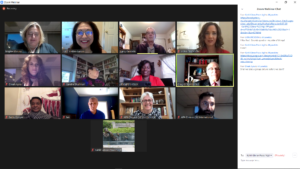
Division 52 organized the Inaugural Khalil Gibran Peace Vigil broadcast live from the American University of Beirut Medical Center during APA’s Convention. Multimedia presentations included Arabic-English Gibran readings, a segment from Salma Hayek’s animated film, The Prophet, music including Three Religions by The Moroccan Philharmonic Orchestra, and B. B. King’s, Peace to the World.
The horrific explosion at the Port of Beirut four days earlier added a somber significance as Divisional President Dr. Brigitte Khoury shared the hearts of Beirutis, pictures, and Hope for Beirut’s future.
In addition to APA, other endorsers included national (AMENA-Psy; ABPP; APPIC; NR) and international associations (ASPPB; PSI CHI) and diverse Divisions.
Presenters’ representation included South Africa, the Middle East, and North America. Dr. Saths Cooper, President (Pan African Psychology Union) delivered a powerful message awakening the collective consciousness during the pandemic and recent acts of extreme racism. Dr. Sandra Shullman, APA President, reminded the audience of the formidable influence that psychology has in peace-making. Dr. Jennifer Kelly, APA President-Elect, inspired the audience highlighting civil rights leadership in adopting peace as an ideology. Dr. Brigitte Khoury and Dr. Larry Gerstein, Division 52 President and President-Elect, delivered beautiful words contextualized by recent events and writings from Gibran.
300+ students, faculty, psychologists, and others representing 5 continents and 20 countries joined the Vigil.
2020 has been an especially challenging year for the international community. The pandemic has further revealed many tensions and the fragility of human life. The aim of the vigil was to promote and seek peace, hope, and resilience. The human spirit can thrive amidst the most challenging circumstances. We hope to continue offering a vigil for future APA conventions, further promoting the powerful inclusivity of Division 52.
Recording: https://www.youtube.com/watch?v=_46qrZOM_5s&feature=youtu.be
Vigil Core development team: Drs. Dinah Ayna, Lora Erickson, Greg Gormanous, Julie Hakim-Larson, Brigitte Khoury
D52 Poster Contest at the 2020 APA Virtual Convention
Each year, APA’s Division of International Psychology (#52) hosts a poster contest at the APA convention. Over the years this contest has taken different forms. Owing to the virtual format of the 2020 contest, we included everyone (students, ECPs, mid-, and late-career professionals)!
The purpose of the contest is about engagement in and celebration of international psychology. Sixteen volunteer judges visited the D52 poster gallery and rated 53 eligible posters across 30 subject areas, evaluating each poster on a 5 point scale. Each poster received at least two reviews. Scores of 4.5 and higher received a first placing; scores between 4.00 and 4.49 received a 2nd placing; scores between 3.50 and 3.99 received a third placing. Other posters received an honorable mention.
The contest was coordinated by D52’s Vice President of Engagement, Lynette Bikos. Judges included Tina Balachandran, Daniel Balva, Karen Brown, Michael Campbell, Fanie Collardeau, Radosveta Dimitrova, Megan Hall, Sue Jacobs, Satoko Kimpara, Breeda McGrath, Renee Staton, Stylianos Syropoulos, Kimberly Wilson, Stacey Waters, and Martha Zlokovich.
If you are interested in coordinating a D52 poster contest at your regional or specialty conference please contact Lynette Bikos at D52@spu.edu
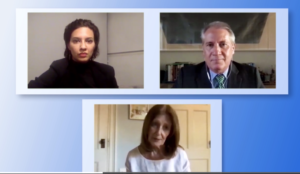
The Divisions of Social Justice of the American Psychological Association consist of over 15 divisions and supports ongoing social justice related research, action, and public policy whilst being inclusive of work related to diversity, equity, and human rights. For the first time in the history of APA, the convention was held digitally. Representatives met weekly for months strategising on what would be an effective topic given the current reality of a Covid-19 2020. Division 52’s representative Dr. Anjhula Bais proposed the climate crisis which all divisions unanimously agreed. The sympoisum included a round robin style of psychology experts from various specialisations (human rights, gender, migration, environment, and conservation) discussing the Climate Crisis’s multiple contexts, possible solutions, and adaptations addressed for the general public.
Division 52 to begin partnership with Hogrefe Publishing
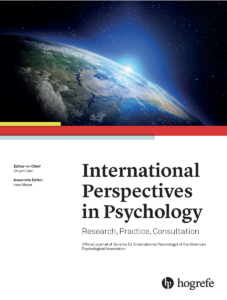 Division 52 is delighted to announce a partnership between the American Psychological Association’s (APA) Division 52 (International Psychology) and Hogrefe Publishing, for the Division’s scientific journal, International Perspectives in Psychology: Research, Practice, Consultation (IPP).
Division 52 is delighted to announce a partnership between the American Psychological Association’s (APA) Division 52 (International Psychology) and Hogrefe Publishing, for the Division’s scientific journal, International Perspectives in Psychology: Research, Practice, Consultation (IPP).
Starting January 2021, International Perspectives in Psychology (IPP) will be published by Hogrefe. The entire journal, including all back issues, will be available online on Hogrefe’s eContent platform.
You can see what is to come!
The new Hogrefe website for the Journal has just been launched – see https://www.hogrefe.com/us/journal/international-perspectives-in-psychology-research-practice-consultation. Take a tour around the journal’s web pages to see the latest calls and options for publishing your work in IPP with Hogrefe.
APA Division 52 COVID-19 Taskforce
Call for Proposals – Psychology and the COVID-19 Pandemic: A Global Perspective
International Perspectives in Psychology: Research, Practice, Consultation
APA Division 52’s Journal
Published by Hogrefe Publishing Corp.
Proposal Submission Deadline: January 31, 2021
Guest Editors
Lawrence H. Gerstein, PhD
George & Frances Ball Distinguished Professor of Psychology-Counseling
Director, Center for Peace and Conflict Studies
Ball State University
Muncie, Indiana, United States
lgerstein@bsu.edu
Falu Rami, PhD
Dr. Falu Global Psychology/Independent Consultant
La Palma, California, United States
drfalurami@gmail.com
Potential authors are invited, but not obliged, to contact the Guest Editors to discuss preliminary ideas.
Details
International Perspectives in Psychology is issuing this call for a special issue of conceptual, methodological, empirical (e.g., qualitative, quantitative, mixed methods), training and education, practical, and policy articles; briefs; and accounts of praxis and lived experience in relation to projects performed by professionals worldwide targeting various aspects of the COVID-19 pandemic. Articles must include a focus on one or more of the following United Nations Sustainable Development Goals: 1, 2, 3, 4, 5, 6, 8, 10, 11, 12, 16, and/or 17.
This special issue will feature work conducted by the APA Division 52 COVID-19 taskforce as well as welcome contributions from: social justice activists and advocates; critical social theorists; emancipatory, empowerment, and liberation researchers, educators, and practitioners; epidemiologists; ethnographers; geographers; governmental researchers and policy makers; public health researchers and policy makers; social policy researchers; political scientists; economists; anthropologists; linguists; new media scholars; and sociologists, as well as researchers, educators, and practitioners in all subdisciplines of psychology.
Submissions
500-word proposals should be sent to the Guest Editors.
Timeline
500-word proposal due: January 31, 2021
Co-editors review proposals and invite full paper submissions: March 1, 2021
Full manuscript due: July 1, 2021
Anticipated publication date: Spring 2022
Additional information about International Perspectives in Psychology and a link to the journal’s submission portal are available on the International Perspectives in Psychology homepage.
Special issue related correspondence can be emailed to the Guest Editors. General correspondence can be emailed to the Editor, Stuart Carr, PhD (S.C.Carr@massey.ac.nz).
2020 APA Division 52 Global Citizen Psychologist Citations Awarded
The APA Global Citizen Psychologist Citation recognizes psychologists who are ambassadors for psychological science in their communities, bringing their professional knowledge, experience and expertise to benefit those around them by volunteering in their community at the local, national or international level.
The inaugural recipients are:

Anjhula Mya
Singh-Bais
In 2019, after years of activism in Malaysia, Anjhula Mya Singh-Bais, Ph.D., became the first psychologist to be appointed a Director of Amnesty International by its Global Assembly in Johannesburg, South Africa. She earned a spot on the World Economic Forum’s Young Global Leaders list of visionary leaders under age 40 for her public education efforts to destigmatize mental illness globally. She has partnered with local and multinational organizations, researching, writing, and speaking in countries from Greenland to the People’s Republic of China. In so doing, she has disseminated the tenets and principles of international psychology far and wide. Dr. Bais exemplifies the dedication of an early career Global Citizen Psychologist, balancing the best of public and private sectors as a practicing psychologist, a human right activist and climate crisis advocate by co-creating conscious leadership models and speaking to world leaders on mental health, resiliency, and anti-fragility while participating in climate and board governance.

Margarida Gaspar
de Matos
Margarida Gaspar de Matos, Ph.D., a psychologist based in Portugal, developed the Social Adventure Program in 1987 as a way to promote psychosocial skills in children and adolescents at risk. In the decades since, she has integrated this program into health behavior networks throughout Europe. At the core of Dr. Gaspar de Matos’ work has been the implementation and evaluation of several volunteer projects promoting socio-emotional competences on risk, health and community interventions in minor supervisory establishments as well as special education schools and centers. She was also chair of the European Federation of Psychologists’ Association board of prevention and intervention. Dr. Gaspar de Matos models what it means to be a senior career Global Citizen Psychologist, training and supervising dozens of psychologist volunteer groups to deliver psychological science and interventions in local communities in Portugal and other European contexts as well as supporting at-risk populations in their journeys towards resilience and wellbeing.

Tatiana
Thérosmé
Tatiana Thérosmé is a Haitian mental health provider, leader, change-maker, and humanitarian. She has personally invested much time, knowledge and passion in advocacy for mental health care reform across multiple regions in Haiti. Tatiana has witnessed firsthand the socially and economically destructive impact of natural disasters and has directly coordinated the development of mental health programs at Zanmi Lasante, Partners in Health in the aftermath of these devastating events. Tatiana’s perseverance and tenacity remains readily evident not only from from this work but also through her lectures and peer-reviewed publications. Overcoming limited opportunities, Tatiana used her psychological training, grit and ingenuity to launch initiatives that not only offered modest financial support to her own mental health efforts but also promoted local businesses and artisan entrepreneurs. Ms. Thérosmé exemplifies the longstanding dedication to serving global marginalized communities that the Global Citizen Psychologist Citation award seeks to celebrate.
Public Education in Honduras: How the Covid-19 Pandemic Exacerbated an On-going Educational Crisis
Rita M. Rivera; Department of Clinical Psychology, Albizu University
The Coronavirus pandemic has aggravated many issues throughout the world. The lockdowns and regulations imposed by different governments have led many to face unprecedented circumstances. Honduras, a country unfortunately known for its high rates of poverty, violence, and inequity, is no exception. Since the declaration of the pandemic in March 2020, the Honduran government mandated complete lockdowns for its entire population of 10 million (The World Bank, 2020). This has led to a spike of unemployment, health and socio-political crises, and factors that exacerbated an on-going educational crisis for most children in the nation.
Honduras is a country where about 66% of the population lives in poverty (The World Bank, 2020). At the end of 2019, about 375,000 children, between the ages of 6 to 17, relied on the public education system administered by the government (Rivera, 2019). Even before the Coronavirus pandemic, the country faced an educational crisis. In December 2019, reports indicated that out of the 2,339,680 children in the country who were of school age, 14% were not receiving any type of formal education (Rivera, 2019). Despite these statistics being made public, and even though the educational issues have been on-going for more than a decade, there seems to be no change in the system that encourages or enforces parents and caregivers to enroll children in schools. El Código de la Niñez, which is the official Honduran code that protects and oversees the rights of the children, states that every minor under 18 years of age has the right to receive an education. Nonetheless, even though children’s rights are legally recognized, they are not truly protected or supported by governmental institutions.
Moreover, the public educational system has faced many issues in the past years. Overall, the quality of the education is poor, specifically in rural areas of the country. Teachers often are forced to go on strikes because they are overworked and under-compensated. There is also a lack of technical training in most public institutions and children are rarely provided with school supplies or textbooks. In addition to this, the curriculum materials are not adapted to the different ethnic and cultural groups of the country, such as the Garifuna or Creole languages (Humanium, n.d.). All of these obstacles discourage caregivers and children, which has resulted in high illiteracy rates over the past years. In February 2020, a month before the declaration of the pandemic, local journals in the country reported that UNESCO’s data showed that the illiteracy rates in Honduras had increased to 13% (Portillo, 2020). These statistics support the notion that the pandemic worsened many pre-existing issues in the country related to education.
Once the government declared mandated lockdowns as preventative measures for Covid-19, the public education in Honduras ceased to exist. All of the children enrolled in the public system have been unable to receive any formal education for months. Most of them have become child workers to support their families and, unfortunately, others have become known as “street children.” Street children are considered one of the poorest and most marginalized groups in the nation. They often scavenge for food in garbage bins, beg for money in stoplights, or, in one of the worst-case scenarios, join gangs and face risk of violence, prostitution, and drug abuse. In the past years, many US news outlets have highlighted how gangs in Honduras substitute formal education and teach children that crime pays (Arce, 2014).
In June 2020, local authorities recognized that they do not know when the public education system will reopen (Reyes, 2020). On the other hand, the Covid-19 pandemic also poses a risk for those students in the private education system. Many of these children are unable to afford technology or Internet services due to the financial crisis that has resulted in their caregivers losing their jobs. Other children have access to a computer or tablet but cannot connect to the Internet due to the constant power outages that come as part of governmental regulations. According to multiple local news outlets that have interviewed parents, caregivers, and children across the country, many have come to accept that children will most likely lose the academic year and not receive any formal education until further notice (Reyes, 2020). In addition, for many poor children, the socio-economic crisis in the nation means that they will most likely never return to school but must continue helping their families as child workers.
The Covid-19 pandemic itself is not to blame for the educational crisis in Honduras. Nevertheless, it has exacerbated many issues in the public educational system, exposing millions of children to illiteracy, abuse, neglect, violence, and child labor. The Honduran law states that children have rights to education, family, and dignity. However, with high rates of child labor and illiteracy, more than 160,000 child orphans, and millions of minors without access to education, it seems that children’s rights and well-being are more at risk than ever in Honduras.
The Experience of Syrian Refugees in Lebanon and the Lebanese Aid Workers who Support Them
Samuel M Girguis; Azusa Pacific University
Jacqueline Parke; Vanguard University
Due to ongoing civil war, more than 5 million Syrians have fled Syria to seek refuge in other countries (UNHCR, 2018). Between 1 million and 1.5 million Syrians, over half of them under the age of 18, settled for some amount of time in neighboring Lebanon. While Lebanon and Syria share similar cultural and religious backgrounds, a long history of political conflict exists between these two countries. This has further exacerbated the humanitarian aid and relief, including mental health support, for the Syrian refugees residing in Lebanon. The experience of the Syrian refugees in Lebanon includes both trauma and resilience in the face of adversity. It is important to identify the ongoing stressors and resilience factors that are a part of the Syrian refugee experience in Lebanon.
On August 4, 2020, Beirut experienced a major explosion at its port, which left at least 204 people dead and over 300,000 without housing. Lebanon was already experiencing a time of political and economic distress and this catastrophic event has had a profound impact on the Lebanese people. Like the Syrian refugees, the Lebanese experience is marked by both trauma and resilience. Given the precarious situation in Lebanon and the continued impact of the refugee population from Syria, it is important to identify the stressors, needs, and resilience factors of the Lebanese aid workers, teachers, and social service providers that continue to serve the Syrian refugee community in Lebanon.
In November and December 2018, qualitative interviews were conducted with 28 Lebanese workers who were providing services to Syrian refugees in Lebanon. The interviews explored the challenges and strengths of the Syrian refugees in Lebanon as well as the perspective of the Lebanese aid workers who are supporting them. While data analysis is ongoing (utilizing conventional content analysis), several themes have emerged. Beyond the trauma connected to fleeing Syria, the Syrian refugee community in Lebanon has exhibited resilience factors connected to their collective identity. However, Syrian refugee youth may struggle with cultural identity formation given their experience of displacement. Lebanese aid workers experienced deep empathy and compassion for the Syrian refugees in Lebanon. However, many feel that the needs are “too great” and the prolonged nature of the displacement is leading to burnout. Additionally, the history of political conflict between Lebanon and Syria impacts the Lebanese aid workers’ attitudes towards the Syrian refugees in Lebanon. Some of these aid workers experienced traumatic events during the occupation of Lebanon by the Syrian government and therefore experience conflicting attitudes towards the Syrian refugees. Of the resilience factors identified by the Lebanese aid workers, religion and spirituality were identified most frequently as the underlying motivation to “love their neighbors, love their enemies.”
It is hoped that when the data from this study is fully analyzed, recommendations will emerge that will assist in supporting both the Lebanese aid workers and the Syrian refugees in Lebanon.
First Psi Chi Chapter installed in Armenia
Yerevan State University installs First Psi Chi Chapter
Professor Hrant Avanesyan, Diana Sargsyan, and Dr. Ani Kalayjian
Armenia is an ancient land, where Noah’s Ark landed on Mount Ararat, and its capital city of Yerevan (founded in 782 BC) marked its 2,800th anniversary in 2018.
On August 20, 2020, history was made in Armenia, when Yerevan State University (YSU) installed the nation’s first chapter of Psi Chi–the International Honor Society in Psychology.
Since its formation at Yale University in 1929, Psi Chi has grown into the world’s largest honor society, with over 750,000 student and faculty life members at over 1,100 schools in the USA, and (since 2009) over 20 schools world-wide. YSU is the first Psi Chi chapter in the entire Transcaucasus region and may now become a model for neighboring schools and nations.
On August 20, the YSU installation ceremony was chaired by YSU Professor of Psychology Hrant Avanesyan, using zoom technology to involve leaders from many cities to install this chapter, and induct eight YSU students as life members of Psi Chi. A yearlong dedicated effort of handful of professionals made this happen, especially Drs. Avanesyan, Kalayjian and Zlokovich.
Participants in Yerevan were YSU Vice-Rector Elina Asriyan, Dean Aleksandr Bagdasaryan, Dr. Diana Sargsyan. From Psi Chi: Executive Director Martha Zlokovich(Missouri), President Deborah Harris-O’Brien (Washington DC), Associate Director of Membership Lisa L. Norman (Tennessee), Dr. Ani Kalayjian (ATOP Meaningfulworld, NewYork/New Jersey), Prof. Harold Takooshian (New York). This 40-minute installation now appears online (See Note 1 below). A report appears in Armenian (Note 2 below).
In 2019, Yerevan State University marked its 100th anniversary with an international psychology conference (Note 3 below), which led to plans for a new Psi Chi chapter at YSU. The new YSU members were invited to visit the USA and New York City in the future, to share the work now being done in Armenia (Note 4 below).
The year long effort was very educational, fruitful, and uplifting. Meaningfulworld had been volunteering in Armenia since 1989, immediately after the devastating earthquake. The last mission was in October 2019, where the seeds of collaboration were planted in several partnering stake holders, amongst them the YSU. It was relevant to be mindful of cultural differences, while sharing the international resources with them.
Notes:
- https://www.facebook.com/diana.sargsyan.946/videos/1811163045701106
- http://www.ysu.am/news/hy/The-YSU-branch-of-Psi-Chi-has-been-founded
- https://drive.google.com/file/d/10URUgroSqISuMvbKXKOMY21j1NV7LiE5/view
- https://fordham.zoom.us/rec/share/uZ11JaPy8UNOfq_d80zNWqM8OIi5aaa81HAa_qUOn0c48RRtBY2leFcG5KHEbOEs
Division 52 Early Career Psychology (ECP) Corner!
There are plenty of opportunities to get involved this coming year in our committee!
*ECP Chair-Elect Nominations
We are seeking nominations for the ECP Chair Elect position. If you are a Division 52 member who obtained your doctoral degree in psychology on or after 2011, please consider running! Elections will be held on the Spring of 2021.
For additional information on the nomination process, please visit the recently revamped Division 52 website at: https://div52.net/
*ECP Subcommittee Committee Open Seats
There are a few open seats in our committee. Serving as a subcommittee member or subcommittee chair can provide one with great opportunities to network and make a difference in our division’s efforts to internationalize APA and our field.
*Mentorship Program
Before the end of 2020, we will be sharing information on the mentorship program organized by the Division 52 ECP Committee in conjunction with the Division 52 Student Committee.
*International Psychology Bulletin Submissions
We welcome 300-400-word submissions relevant to the field of International Psychology from any early career psychologist affiliated to Division 52. To promote diversity and inclusion, we will be accepting submissions in languages other than English!
*Convention Events
The 2021 APA Convention will follow an hybrid model, which provides APA affiliates working internationally with a great opportunity to propose events to be held virtually.
The ECP Committee will gladly walk you through the proposal submission process. Additional information regarding this process can be found at: https://convention.apa.org/proposals
Division Programming Submission Deadline: January 12th, 2021, 5pm EST.
We also welcome your suggestions on suite programming you would like for us to organize for the upcoming APA convention.
For additional information on any of the aforementioned opportunities please email us:
Cristina Cruza-Guet, PhD (Chair) @ cristcru@upenn.edu
Antonio Valdivia, PhD (Incoming Chair) @ javaldivia@tec.mx
Katelyn Poelker, PhD (Past Chair) @ katepoelker@gmail.com
Lora Erickson, PhD (Chair Elect) @ LErickson@johnsonu.edu
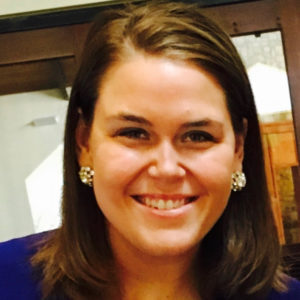 We would like to express our gratitude to Dr. Katelyn Poelker for her dedication to service and meaningful contributions to our committee during her term as Chair Elect, Chair, and Past Chair, ending this year. Thank you Kate! You will be missed!
We would like to express our gratitude to Dr. Katelyn Poelker for her dedication to service and meaningful contributions to our committee during her term as Chair Elect, Chair, and Past Chair, ending this year. Thank you Kate! You will be missed!
Division 52 Inside Scoop on Psi Chi Awards, Grants, and Scholarships
Martha S. Zlokovich, PhD
Daniel Balva, M.S., NCC, CRC
For this edition of the IPB, we wanted to highlight some important student funding opportunities by a great organization that often works in collaboration with Division 52, and always places student needs at the forefront: Psi Chi, the International Honor Society in Psychology.
Over the last few years, Psi Chi has made about $400,000 in awards, grants, and scholarships available to members annually. For the current academic year, however, the Board reduced the total due to the impact of the pandemic on the economy and on conference travel. Nevertheless, Psi Chi members may apply for scholarships, awards, and grants to support their studies, research projects, or travel to psychology conferences to present research – during the pandemic travel grants may be used to pay virtual conference registration fees.
Research awards are available to members who submit research projects to the Psi Chi program at the six regional conventions in the US, and at APA and APS conventions. Online presentations of student research at regional and APS conventions is available on the Open Science Framework in the Psi Chi Research Poster & Paper Repository, https://osf.io/u6rn9/.
Some research grants support particular topics, such as the Mamie Phipps Clark research grants for work on diversity topics, and the Psi Chi/Robert Cialdini Undergraduate Research Grant for Field Research in Social Psychology. Dr. Cialdini has extended field research to include online projects while COVID-19 limits other forms of field research. Psi Chi also gives two annual diversity research awards, one for an article published in the Psi Chi Journal of Psychological Research and one in the Eye on Psi Chi magazine.
Students and faculty may only join Psi Chi through a chapter on their own university campus – and there are 24 chapters outside the US 50 states, located in 14 different countries and three U.S. territories. For Division 52 members who are at a campus with a chapter, joining Psi Chi opens opportunities for them to apply for these benefits. Furthermore, once people join Psi Chi, they become lifetime members. This means they will be eligible to apply for Psi Chi awards, grants, and scholarships if they move to another university – any university in the world – regardless of whether their new university has a chapter of Psi Chi. Of course, if it doesn’t have a chapter, they could encourage their new campus to apply for one!
Members can search for awards, grants, and scholarships on Psi Chi’s website, www.psichi.org, by clicking on the AWARDS/GRANTS tab and picking the dropdown category that best applies to them – undergraduate student, graduate student, or faculty [instructor/professor] member. We also have chapter awards and grants. Only undergraduate and graduate students may apply for one of 16 annual $3,000 scholarships.
Some applications are only open once per year, while others have two or three rounds of funding per year. We recommend exploring the website and noting upcoming submission deadlines.
For Division 52 members, it is important to know that Psi Chi’s mission is recognizing and promoting excellence in the science and application of psychology. In addition, it is important to know that Psi Chi supports this mission not only through the work of the Board of Directors and staff, but also through three advisory committees, each chaired by a director. Dr. Brien Ashdown just started as Psi Chi’s first International Director January 2020, leading the International Advisory Committee. Anyone teaching or studying at a university outside the 50 states who is interested in applying for a chapter is encouraged to contact Dr. Ashdown.
Division 52 members may also be interested in our Research Advisory Committee, Diversity Advisory Committee, and new Faculty Support Committee. We are current searching for our first Faculty Support Director.
Most important to know? It is certain you will not receive a Psi Chi award, grant, or scholarship if you don’t apply – so we highly recommend that you take advantage of these great funding opportunities and apply!
Handbook of Intercultural Training, 4th Edition, published just now by Cambridge University Press. https://www.cambridge.org/us/academic/subjects/psychology/cultural-psychology/cambridge-handbook-intercultural-training-4th-edition?format=PB
Division 52 Member Award
Serdar M. Değirmencioğlu was awarded the Josephine “Scout” Wollman Fuller Award by Psychologists for Social Responsibility. The Award is given annually to an individual or organization involved with peace and social justice for children.
The Josephine “Scout” Wollman Fuller Award was initiated in 2008 by Psychologists for Social Responsibility and the parents and family of “Scout” to honor the memory and life of “Scout” who passed away in 2007 following her struggle with cancer. Scout was only eight years old when she passed away. “Scout” was the daughter of Neil Wollman, a well-known peace advocate and activist and a longtime member of PsySR. Throughout her brief but caring life, Scout was a strong voice for peace in her school and community. As the award states: “‘Scout’ was wise, caring, and concerned for the needy of the world. She was both a learner and a teacher.”
Division 52 Member Publication
Face masks as layers of meaning in times of COVID-19
Tateo, L. (2020). Face masks as layers of meaning in times of COVID-19. Culture & Psychology. https://doi.org/10.1177/1354067X20957549
The article published Open Access is written by one members of the COVID-19 Task Force. The pandemic of COVID-19 has brought to the front a particular object: the face mask. I have explored the way people make-meaning of an object generally associated with the medical context that, under exceptional circumstances, can become a presence in everyday life. Understanding how people make meaning of their use is important. Using cultural psychology, I analyse preferences toward different types of face masks people would wear in public. The study involved 2 groups, 44 Norwegian university students and 60 international academics. In particular, I have focused on the role of the mask in regulating people affective experience. The mask evokes safety and fear, it mediates in the auto-dialogue between “I” and “Me” through the “Other”,and in the hetero-dialogue between “I” and the “Other” through “Me” The dialogue is characterized by a certain ambivalence, as expected. Meaning-making is indeed the way to deal with the ambivalence of human existence
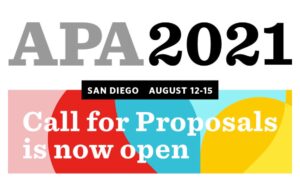
APA is currently seeking proposals for APA 2021 sessions, CE workshops, and more@ If you are a subject matter expert, ECP, or student with new research or applications to share, and a speaker wo can connect, we want to hear from you!
With the uncertainty around COVID-19, APA is hoping to have an in-person meeting, but it needs to plan for the best of both. At this time, Divisions are planning for 100% virtual programming.
For more information visit: https://convention.apa.org/proposals. Please note that all submissions must be completed on the applicable date listed in the above webpage by 5:00pm Eastern time.
 ICP 2020-Virtual
ICP 2020-Virtual
Join colleagues for three days of talks, networking and collaboration
See https://icpweb.org/icp-annual-conference/2020virtual/
Plenaries: Saths Cooper (The Quest for Human Rights); Ellyn Kaschak (Human Rights and Wrongs – 50 Years of Struggle and Change for Women
Symposia: Human Rights and COVID-19; Women and Human Rights; Climate Justice
Lightning Talks / Posters: Interactive sessions with short talks and discussion
Human Rights Event: readings, music and more
Conference Registration: $10/5 for ICP members; $30/$10 for nonmembers
International psychology in the Eastern Psychological Association
Back in 2002, the Eastern Psychological Association (EPA) was a pioneer to become the first of the seven U.S. regionals to offer a program in “international psychology”—which is now a model for other regionals. For 18 years, EPA has featured some of the world leaders in psychology.
When the EPA in Boston in March of 2020 was cancelled by state authorities, the unstoppable EPA Board opted to hold a virtual conference on June 17-18. This EPA international program included over 20 presentations from as far as Japan. A highlight of this program was a video salute to the beloved Jean Lau Chi (1944-2020), who was already in this EPA program. See this video salute: https://cbsloc.al/3i3THIE
The deadline is now November 15, 2020 for the 2021 EPA international program March 4-6 in Philadelphia, which is now virtual. Check details from www.easternpsychological.org , or EPA international chair Harold Takooshian, takoosh@aol.com
LA PUBLICACIÓN CIENTÍFICA EN PSICOLOGÍA ENLATINOAMÉRICA. RETOS Y PERSPECTIVAS
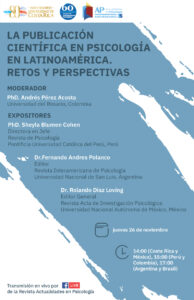
Mas información: https://www.facebook.com/groups/div52/permalink/10157670996225796/
International Perspectives in Psychology: Research, Practice, Consultation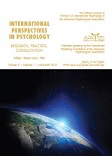
Building Back Better with International Perspectives in Psychology
Stuart C. Carr and Ines Meyer
School of Psychology, Massey University, Aotearoa/New Zealand
Ines Meyer, School of Management Studies, University of Cape Town, South Africa
These are auspicious times for the future of the world, and for the sustainability of humankind. As researchers, practitioners and consultants from across the globe, we have a role to play in co-shaping that future. With this in mind, and in the spirit of co-design and partnership under SDG-17, we are delighted to make the following announcement with and about the Division’s October 2020 issue of International Perspectives in Psychology: Research, Practice, Consultation.
First, the journal has launched a series of internationally responsive Special Issues. Currently these include for instance: Global changes in the world of work and personal lives in the wake of the 2020 Pandemic (https://www.apa.org/pubs/journals/ipp/call-for-papers-global-changes-covid-19); and Women during Covid (https://www.apa.org/pubs/journals/ipp/call-for-papers-women-covid-19). Additional Special Issues are planned, and you are warmly welcomed to suggest special issue themes. If you would like to propose one, please do contact us on s.c.carr@massey.ac.nz to discuss your idea and proposed international editing team.
Resonating with these special issues, in the current October issue of IPP, we are honored to have a range of international perspectives on, and contributions to, our applied understanding of mental health and well-being, across a variety of international settings and sectors.
A first paper focuses on the needs of international students from diverse settings across Asia who are studying in the United States (Daga & Raval, 2020). The study highlights: needs, ways, and means for educational systems to develop more culturally informed understandings of distress and well-being, and culturally sensitive mental health services for international students. A second paper in this issue focuses on the mental health needs of people in the Central African Republic who are often traumatised and displaced (Patel, Unanue, Crittenden, Kieschnick, Froming, Brown, & Froming, 2020). This paper highlights the importance of continuing to develop and maintain systems that provide safety, education, and mental health care services to the general population, and the pivotal role for government and political support for these systems to sustain. In a third paper, we are introduced to work in the civil society sector namely Non-Government Organizations (NGOs) in The Philippines. Teng-Calleja, Dee, Dizon, and Aldaba (2020) argue that the concept of ‘work-life balance’ may be out-of-kilter with real-life work demands, and that the concept of ‘work-life synthesis’ may be a more apt term for NGOs to consider when setting policy that protects the wellbeing of their workers, and thereby the communities with whom their work is integrated. In almost every part of the world, the Covid-19 pandemic has altered how life “works”. Amongst others, it has highlighted how relevant mental health and wellbeing are for a sustainable future. We hope that as the readers of International Perspectives in Psychology you are remaining safe and healthy, both physically and mentally.
*Extracted from Editorial (2020, October), IPP.
References
Daga, S., Lin, K.L., & Raval, V . V. (2020). Asian international students’ construals of well-being and distress. International Perspectives in Psychology: Research, Practice, Consultation, in press.
Patel, S. G., Unanue, I.M., Crittenden, M.S.P., Kieschnick, D.M.S., Froming, K., Brown, L.M., & Froming, W. (2020). A qualitative approach to informing mental health programming in Central African Republic. International Perspectives in Psychology: Research, Practice, Consultation, in press.
Teng-Calleja, M., Dee. A. D., Dizon, LCT., & Albaba, J.R.M. (2020). “Work is Life”: An Interpretative Phenomenological Analysis of the experiences of work-life balance among Non-Government Workers. International Perspectives in Psychology: Research, Practice, Consultation, in press.
[1] Extracted from Editorial (2020, October), IPP.

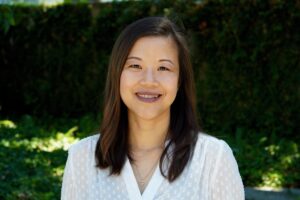
We hope that all of our fellow members are staying well and engaging in social connection during this time. Psychologists engaged in international and global work truly appreciate the importance for meaningful relationships, please continue to submit your important work and thoughts, news and updates, and recognition that will support the IPB. We thank everyone who submitted pieces for this issue of the IPB.
IPB and the Divsion’s journal, International Perspectives in Psychology (IPP), have begun to formalize our relationship. Thanks to Dr. Stuart Carr, editor of IPP, our Bulletin will have a piece focusing on current position and focus of IPP in each issue. We have also made a joint decision that IPB and IPP should disseminate on a consistent schedule. Beginning in January 2021, IPB will move to a quarterly publication. We hope that this will increase traffic between IPB an IPP.
So, this means we will be calling on you, our colleagues, to provide IPB with pieces for a January publication quickly. Please email IPBDiv52@gmail.com with submissions by December 15, 2020. In your email, please include a picture or image related to the piece, where applicable. We will follow-up with a detailed email.
Additionally, IPB is recruiting two members to the IPB editorial team: (1) Creativity and Layout, and (2) Outreach. We see this as an opportunity for a student or ECP member to get involved in the development and dissemination of IPB, but are open to any members of Division 52. Please reach out to IPBDiv52@gmail.com if you are interested.
All our best,
Steve and Joyce
